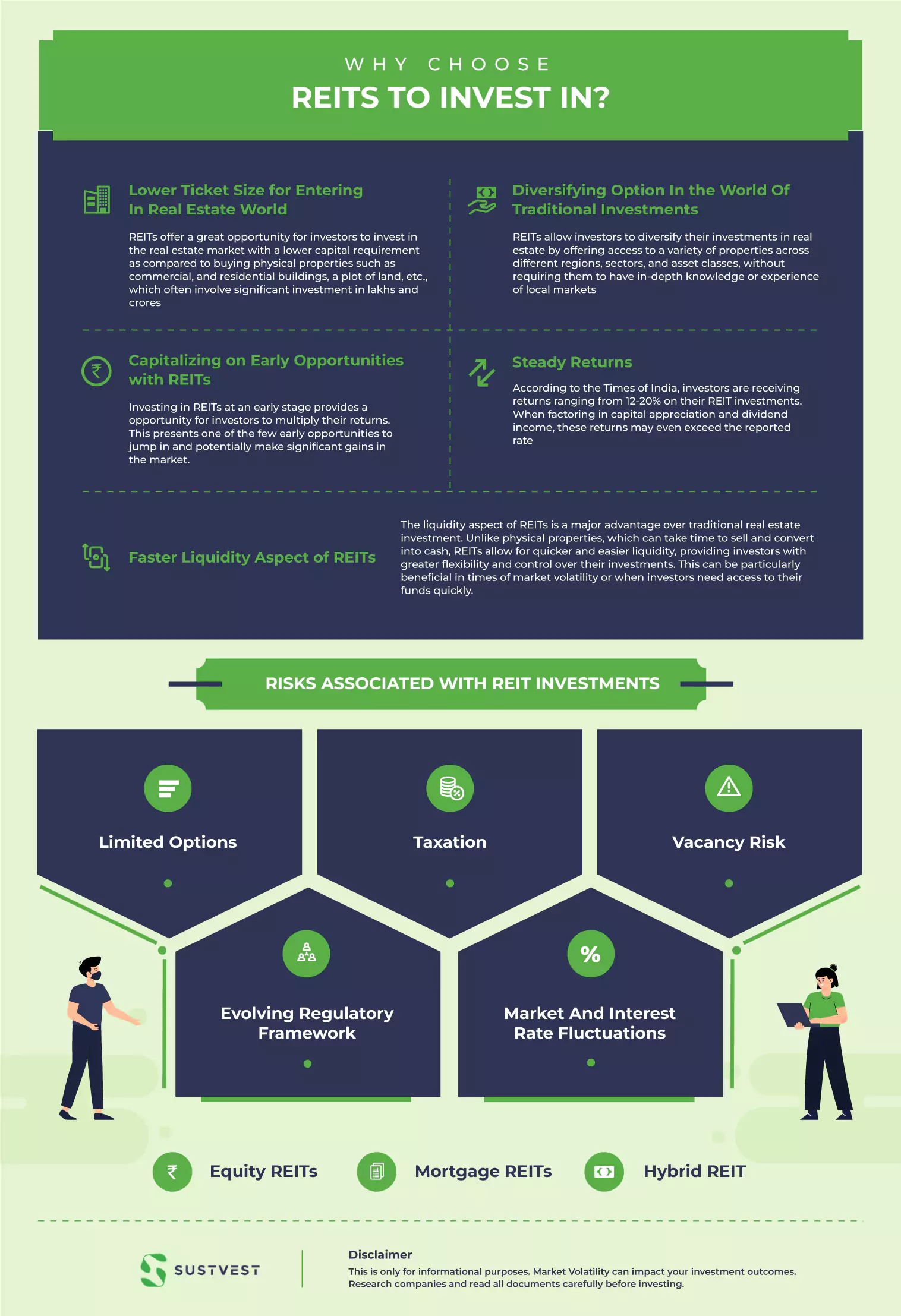“My father’s real estate investment almost doubled, and I aspire to follow his footsteps. However, I lack the capital and my local real estate market seems saturated and overpriced”.
Such concerns have become a thing of the past with the introduction of REITs. These emerging investment instruments offer a remarkable passive income idea and portfolio diversification.
Is it too good to be true? In this blog, we will explore the pros, cons, taxation system, and available options for REITs to invest in India. uncovering the truth behind this exciting investment avenue. Read on as we enhance our understanding.

What Is REIT Investment?
REITs, also known as Real Estate Investment Trusts, are companies or institutions that collect a pool of investment from investors and give them returns based on rental income. They own multiple real estate assets like hospitals, shopping malls, and housing establishments.
Instead of investing a hefty amount in a real estate property, investors can pool their money together to buy a portion of a property through REIT.
This allows them to pay less and own shares of the property, while also enjoying rental income generated from leasing the property.
What Are the Criteria for Qualifying as an Indian REIT by SEBI?
SEBI had issued specific criteria for a company to be qualified as a REIT which include the following
- The Minimum asset size of a company must be 500 Crores
- The company must invest 80% of its asset in revenue-generating properties.
- However, the remaining 20% is allowed to be invested in under-construction properties
- The company must distribute at least 90% of its net distributable cash flows to its shareholders as dividends each year.
- The company must employ a trustee to safeguard the interests of unit holders(investors), and managers to manage the assets of the REIT and oversee day-to-day operations. And a sponsor to bring initial capital and set up the REIT.
How REIT Helps Investors and Sponsors
REITs offer a lucrative investment option for investors, providing them with the opportunity to invest in real estate without the large upfront costs. Investors can purchase units of properties through REITs and receive rental income in return.
For sponsors, launching a REIT allows them to raise capital from investors without relying on traditional bank financing or incurring substantial debt. This offers greater financial flexibility and enables sponsors to pursue real estate projects that may have been inaccessible otherwise.
Types of REITs to Invest in India?
There are three types of Real Estate Investment Trusts (REITs) worth considering for investment. Let’s take a brief look at each of them.
Equity REITs
Being one of the most popular and common, equity REITs focus on income-generating properties. These properties include office buildings, residential complexes, shopping malls, industrial facilities, and more.
Talking about returns, equity REITs earn income through payments made by tenants who lease these properties in the form of rents. SustVest gives you a lucrative investment opportunity that lets you invest in rooftop solar projects and gives up to 10 -15% returns annually.
Mortgage REITs
While mortgage REITs are currently not available in India, if they were to enter the market, they could offer investors a diversifying option with the potential for higher dividend yields.
Similar to equity REITs, mortgage REITs would not directly own physical properties. Instead, they would hold mortgages or mortgage-backed securities as their primary assets.
Rather than relying on rental income, these REITs would generate returns from the EMI or interest paid on the mortgages. This type of alternative investment avenue could provide investors with an additional choice for potentially earning income in the real estate sector.
Hybrid REIT
In this REIT, investors can diversify their risk and return by gaining exposure to both the real estate market and the mortgage market. They have the opportunity to earn both interest income from mortgage investments and dividends from owning real estate properties.
Hybrid REITs fall between equity and mortgage REITs, combining the features of both investment types. Like equity REITs, they own and operate properties, while also incorporating mortgage investments for additional income streams.
REITs to Invest in India: Tax Compliance for REIT Investment in India
Deciding about REITSs to invest in India entails specific tax implications that should be taken into consideration. Let’s explore the tax aspects associated with REIT investments in India.
- The taxability of dividends in equity REITs depends entirely on whether or not the REIT company has opted for the special purpose vehicle (SPV) concessional tax regime.
- In the case where the REIT has chosen the SPV concessional tax regime, investors are required to pay a tax rate of 10% on dividend income.
- Conversely, if the REIT has not opted for the SPV concessional tax regime, dividend income is exempt from tax.
- As REITs are also listed on the stock market, they can be subject to a short-term capital gain tax or a long-term capital gain tax based on the holding period.
- Long-Term Capital Gains (LTCG): For holding a REIT investment for more than 3 years, an LTCG tax rate of 10% will be levied on gains exceeding 1 lakh
- Short-Term Capital Gains (STCG): If the holding period of a REIT investment is less than 3 years, the STCG tax rate of 15% will be levied on the gains.
Are REIT Investments Risky?
Like any investment, REITs also carry a certain level of risk, including market fluctuation. However, there are additional non-obvious risks associated with REIT investments that investors should be aware of. These risks include the following.
Limited Options
Since REITs are relatively new in India, there are currently only a few options available for investment.
Evolving Regulatory Framework
The regulatory framework for REITs in India is still evolving, which can make it challenging for investors to make informed decisions.
Taxation
Investors in REITs are subject to taxation, and the returns are not tax-free.
Market And Interest Rate Fluctuations
REITs are influenced by market conditions and interest rate fluctuations, which can impact their performance.
Vacancy Risk
Equity REITs are susceptible to properties going vacant, leading to a potential loss of rental income for investors.

Why Choose REITs to Invest in?
After identifying the risks associated with REITs, we will now highlight five compelling reasons why you should consider choosing REITs to invest in as an alternative investment option.
Lower Ticket Size for Entering In Real Estate World
REITs offer a great opportunity for investors to invest in the real estate market with a lower capital requirement as compared to buying physical properties such as commercial, and residential buildings, a plot of land, etc., which often involve significant investment in lakhs and crores.
In contrast, with REITs, you can invest barely thousands, making it a more feasible and accessible option.
Diversifying Option In the World Of Traditional Investments
REITs allow investors to diversify their investments in real estate by offering access to a variety of properties across different regions, sectors, and asset classes, without requiring them to have in-depth knowledge or experience of local markets
It might be the future of India’s real estate if we compare it to its immense growth in foreign markets
Capitalizing on Early Opportunities with REITs
Investing in REITs at an early stage provides an opportunity for investors to multiply their returns. This presents one of the few early opportunities to jump in and potentially make significant gains in the market.
Steady Returns
According to the Times of India, investors are receiving returns ranging from 12-20% on their REIT investments. When factoring in capital appreciation and dividend income, these returns may even exceed the reported rate
Faster Liquidity Aspect of REITs
The liquidity aspect of REITs is a major advantage over traditional real estate investment. Unlike physical properties, which can take time to sell and convert into cash, REITs allow for quicker and easier liquidity, providing investors with greater flexibility and control over their investments. This can be particularly beneficial in times of market volatility or when investors need access to their funds quickly.
How To Invest In REITs In India?
When considering REITs to invest in India, begin by screening the available options, such as Embassy Office Parks REIT, Brookfield India Real Estate Trust, and Mindspace Business Parks REIT. Next, open a demat account and purchase shares or opt for mutual funds. It’s inevitable to conduct thorough research and seek guidance from financial experts before making any investment decisions.
FAQs: Complete Guide of REITs to invest in India
What is a REIT investment?
REIT investments are the investments that are made by a company that owns and operates real estate to generate income. For example, these companies lease buildings and collect rent on them.
Are REIT investment regulated in India?
Yes, REIT investment are regulated in India by the Securities and Exchange Board of India (SEBI).
Why You Must Invest In A Diversifying Investment Alternative
REITs to invest in, much like solar energy and other renewable investments in the past, have emerged as a promising investment opportunities. They fill a gap in the real estate market and offer the potential for stable income and capital appreciation. However, it’s important not to overlook the risks highlighted in the blog and to assess your risk appetite accordingly.
If you’re seeking stability and a potential return of 10-12% annually, consider exploring sustvest—a sustainable investment alternative. Not only does it provide financial returns, but it also contributes to environmental sustainability. Make an informed choice that aligns with your investment goals and values.

Founder of Sustvest
Hardik completed his B.Tech from BITS Pilani. Keeping the current global scenario, the growth of renewable energy in mind, and people looking for investment opportunities in mind he founded SustVest ( formerly, Solar Grid X ) in 2018. This venture led him to achieve the ‘Emerging Fintech Talent of the Year in MENA region ‘ in October 2019.




